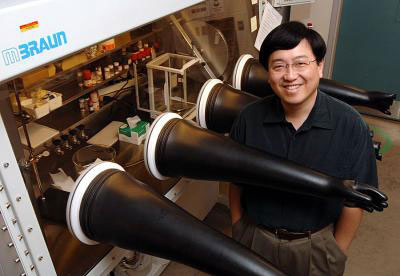| Posted: January 15, 2010 |
$5.3 million study of biodiesel production from algae using silica nanoparticles |
|
(Nanowerk News) Two teams of Iowa State University researchers will receive a total of $8 million over three years from a $78 million U.S. Department of Energy program to research and develop advanced biofuels.
|
|
Victor Lin – professor of chemistry, director of the Institute for Physical Research and Technology's Center for Catalysis at Iowa State and chief technologist and founder of Catilin Inc. – will lead a team embarking on a $5.3 million study of biodiesel production from algae.
|
|
And Robert C. Brown – an Anson Marston Distinguished Professor in Engineering, the Gary and Donna Hoover Chair in Mechanical Engineering and the Iowa Farm Bureau director of the Bioeconomy Institute – will lead a $2.7 million study of the thermochemical and catalytic conversion of biomass to fuels.
|
 |
| Victor Lin will lead a $5.3 million study of biodiesel production from algae using silica nanoparticles.
|
|
"These grants to Iowa State University researchers demonstrate the breadth and strength of our programs in advanced biofuels," said Sharron Quisenberry, Iowa State's vice president for research and economic development. "We have researchers who can help this national effort to develop clean, sustainable and cost-effective sources of energy. These grants are two more examples of how Iowa State translates discoveries into viable technologies and products that strengthen the economies of Iowa and the world."
|
|
The Iowa State research projects are part of a Department of Energy effort supported by the American Recovery and Reinvestment Act. The program creates two national research groups charged with finding ways to break down barriers to the commercialization of advanced biofuels (such as green gasoline) while using the existing fuel marketing and transportation infrastructure:
|
|
– $44 million (plus $11 million in non-federal, cost-share funding) creates the National Alliance for Advanced Biofuels and Bioproducts led by the Donald Danforth Plant Science Center in St. Louis, Mo.
|
|
– And $34 million (plus $8.4 million in non-federal, cost-share funding) creates the National Advanced Biofuels Consortium led by the National Renewable Energy Laboratory in Golden, Colo., and the Pacific Northwest National Laboratory in Richland, Wash.
|
|
Lin's research team is part of the National Alliance for Advanced Biofuels and Bioproducts. It includes researchers at Catilin Inc., a catalyst technology company that Lin founded in 2007 with the help of Mohr Davidow Ventures of Menlo Park, Calif.
|
|
The researchers will study how silica nanoparticles developed by Lin – and produced by Ames-based Catilin Inc. – can be used to selectively extract and sequester fuel-related, high-value compounds from a mixture containing lipids from algae. The rest of the algal oil will be converted to biodiesel using Catilin's commercially available T300 catalyst.
|
|
"Our technology is instrumental in several key steps of the algae-to-biofuels supply chain as the efficient oil-extraction and solid catalyst provides a cost effective conversion route," Lin said.
|
|
Brown's research team is part of the National Advanced Biofuels Consortium. It includes Brent Shanks, the director of the Center for Biorenewable Chemicals based at Iowa State and professor of chemical and biological engineering; James Dumesic, Steenbock Professor of chemical and biological engineering at the University of Wisconsin-Madison; and Linda Broadbelt, professor and chair of chemical and biological engineering at Northwestern University in Evanston, Ill.
|
|
The researchers will investigate the chemical reactions of fast pyrolysis (a process that uses heat in the absence of oxygen to decompose biomass into a liquid bio-oil). They'll also study the catalytic upgrading of bio-oil to transportation fuels.
|
|
"The Department of Energy organized these consortia for the purpose of accelerating the development of advanced biofuels through a coordinated research program among biofuels researchers across the United States," said Brown. "We are pleased that the Bioeconomy Institute was selected to be part of this national effort."
|
|
The national research effort is aimed at building a domestic bio-industry, creating jobs and reducing the country's dependence on foreign oil, according to Steven Chu, the U.S. secretary of energy.
|
|
"Advanced biofuels are crucial to building a clean energy economy," Chu said. "By harnessing the power of science and technology, we can bring new biofuels to market and develop a cleaner and more sustainable transportation sector."
|

